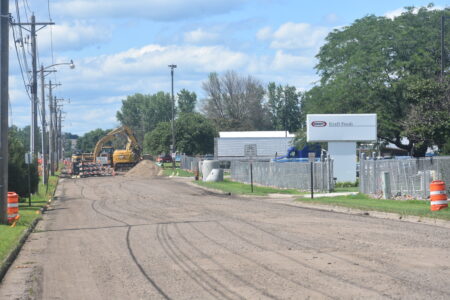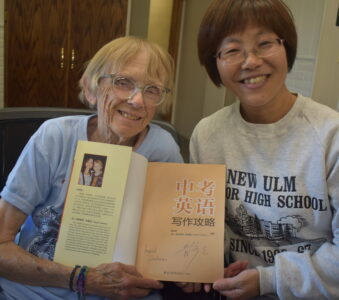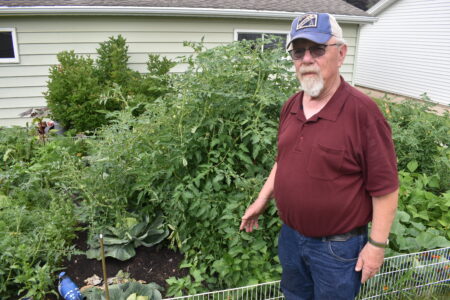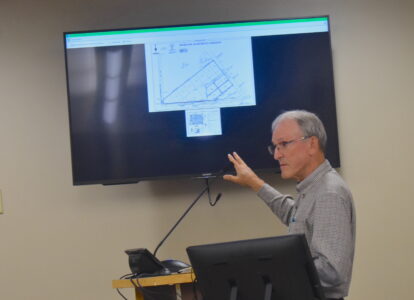Simon discusses voting law changes

Staff photo by Clay Schuldt Minnesota Secretary of State Steve Simon visited New Ulm to talk about new voter laws at the New Ulm Library on Tuesday.
NEW ULM — Minnesota Secretary of State Steve Simon visited New Ulm to discuss with community members new voting laws that have gone into effect.
The New Ulm League of Women Voters (LWV) moderated the event. The public was allowed to ask questions of Simon and provide feedback on the new laws.
Simon said it was tempting to think the 2024 election was a long way off, but reminded the audience Minnesota’s presidential nomination primary is Tuesday, March 5 but the absentee voting period is Jan. 19.
“We are five and a half months from being able to vote for president of the United States, at least in the primary,” Simon said.
With the election season right around the corner, he believed everyone regardless of party affiliation wants to know the election rules. He did not want anyone to be confused about the rules leading to anyone failing to register to vote.
Simon gave a summary of the three biggest changes to election laws.
The first major change was restoring the right to vote for people with felony convictions who are not currently incarcerated. Previously, Minnesota did not allow felons to vote until they were released from prison and completed probation or supervised release. The new law allows felons to vote as soon as they are released from prison. Individuals on probation previously barred from voting have had their voting rights restored. This means roughly 55,000 Minnesotans are once again eligible to vote. Simon said the challenge with this law is informing people their rights have been restored. In some cases, convicted felons have been unable to vote for years and even decades. The Secretary of State Office is working with the Department of Correction to make sure individuals are aware their voting rights were restored.
“We want people to take advantage of the right to vote,” Simon said. “Getting the word out is going to be key over the next year or half.”
Probation Officers across the state have pledged to remind individuals on probation they have the right to vote.
Pat Booker, a parol officer with 35 years of experience, thanked legislators for passing the Restore the Vote bill, saying it was long overdue. Booker believed giving ex-felons the right to vote gave them stakes in the community.
Automatic Voter Registration was the second big change Simon discussed, though he believed the name was misleading.
“It really isn’t automatic,” he said. “Real human beings are still filtering, screening and vetting applicants.”
Simon explained that before passing this law, whenever a person in Minnesota renewed a driver’s license or state ID card, a box could be checked that would register a person to vote. This is because the same information needed to renew a driver’s license is the same information needed to register to vote.
Simon said the law changed so people no longer need to check the box. It is presumed the individual renewing the license or ID wants to register to vote. Real people will need to check to make sure this person is eligible to vote in Minnesota. A person who is under 18 or is not a resident of Minnesota would not be registered.
Later in the discussion, Simon was asked about how this law worked with the new Drivers License for All law. Under the new Drivers License for All, anyone living in Minnesota could get a driver’s license regardless of immigration status. With automatic voting, human screeners will be checking citizenship status before registering voters.
Simon said this system would help get individuals registered before election day. He believed this could improve election security as more voters would have been screened and vetted months or weeks before election day.
Related to automatic voting registration was the third big change to voting. Pre-registration for 16- and 17-year-olds. Previously, in Minnesota, a person who was 17 could register to vote if they would be 18 by the next election. The new law will allow people 16 or 17 to fill out all the forms in advance, regardless of when they turn 18. If all forms are filled out in advance and if everything checks out with the screening, the teenager will be registered on their 18th birthday without taking any extra steps.
Simon said one advantage of this system is getting young people to think of themselves as voters before they are 18, making it more likely that they will become lifelong voters.
Brown County Sheriff Jason Seidl spoke in favor of alerting high school students about registering to vote. He believed if released felons were being informed of their rights to vote, high school students should be given the same information.
Mike Thom had questions about the security of mail-in ballots and who had access to the voter’s registry.
Simon said in Minnesota, mail-in voting requires the person requesting the ballot to provide some ID. This same ID information must be returned with the ballot. This means that in the event a potential mail thief steals a blank ballot, they will not have the correct ID information for each ballot. They would also need to forge the signature of the voter and the signature of the witness. In addition, voters can track their ballot online, similar to an Amazon or UPS package. This means a person sending in a ballot can verify it reach its destination and was processed.
Thom also questions if there were issues of people coming to vote, but were told they had already voted.
Simon said there were incidents where people voted by absentee ballot but forgot and then tried to vote in person.
In 2020, there were 3.3 million voters in Minnesota. The number of confirmed cases of wrong-doing was 17. Simon said this was 17 too many, but was relatively small on the whole.
State Rep. Paul Torkelson attended the discussion and asked about expanded early voting and the increased costs for county election offices.
Simon confirmed these laws would increase the costs and responsibility for counties and cities holding elections, but would give voters more options.
LWV closed the discussion by thanking everyone who works to make elections possible.






